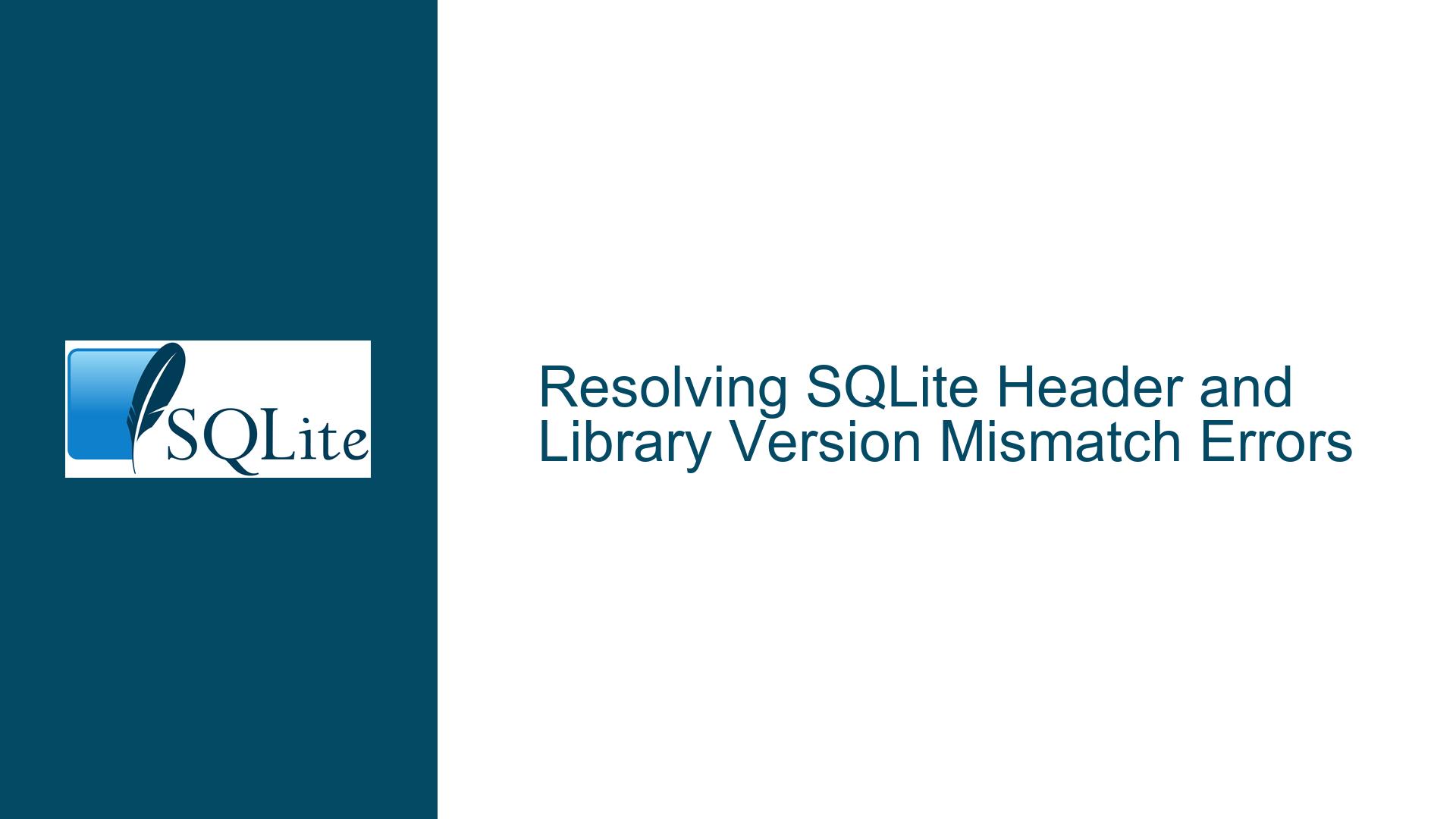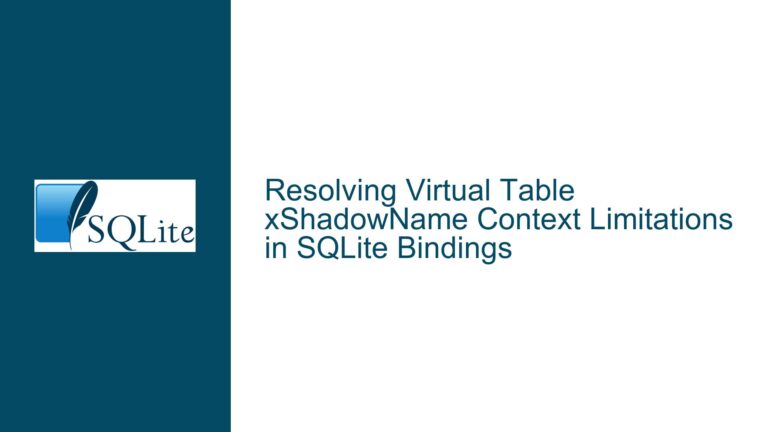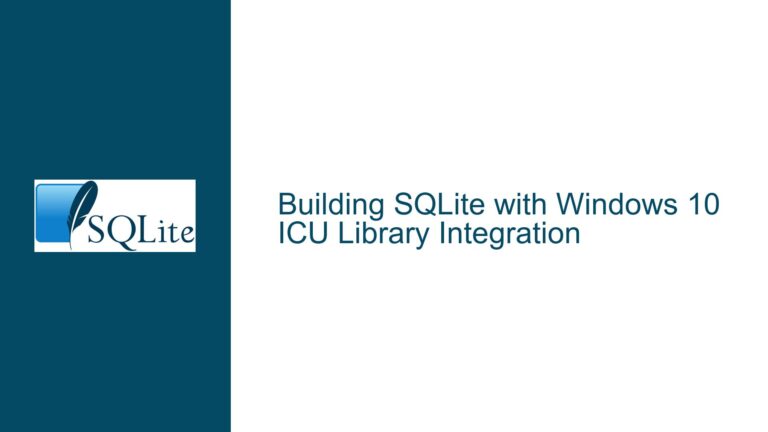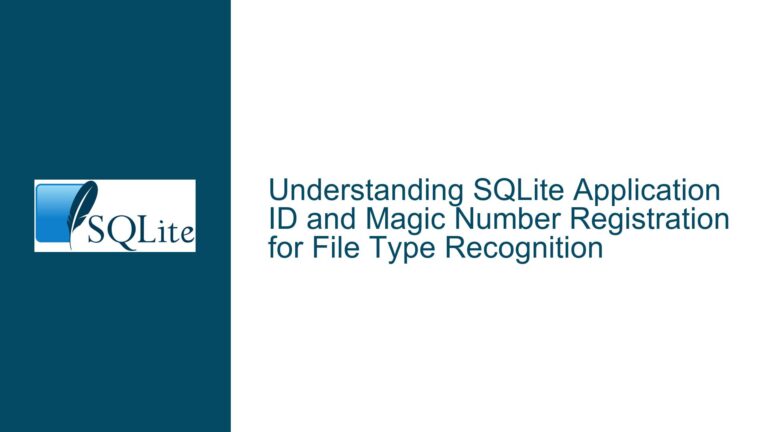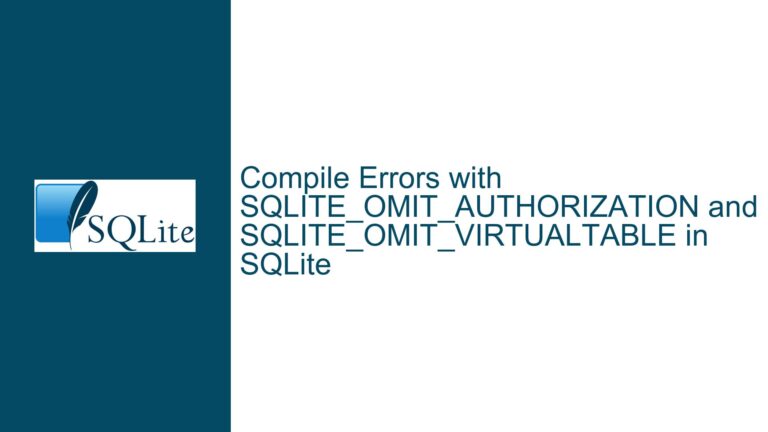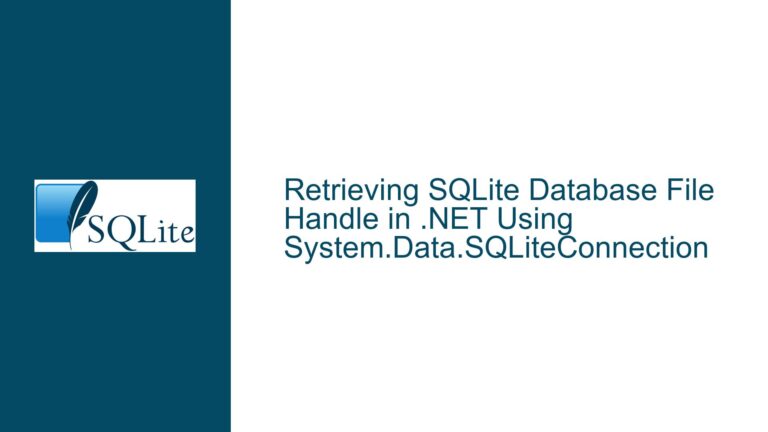Resolving SQLite Header and Library Version Mismatch Errors
Issue Overview: SQLite Header-Source Version Conflict in Runtime Environment
The core problem arises when attempting to execute SQLite operations (e.g., opening a database file via the sqlite3 CLI or a custom application) and encountering a version mismatch error between the SQLite header file used during compilation and the shared library loaded at runtime. This error manifests as a message comparing two distinct SQLite version timestamps and commit hashes, indicating incompatible components in the software stack. In the case described, the system reports a header version from December 2018 (SQLite 3.26.0) and a source/library version from October 2013 (SQLite 3.8.1), creating a five-year gap between components. This discrepancy prevents normal operation because SQLite’s internal consistency checks detect mismatched compilation and runtime environments, which could lead to undefined behavior, memory corruption, or data loss if ignored.
The conflict occurs at the intersection of three critical layers: (1) the SQLite shared library (libsqlite3.so) dynamically linked by applications, (2) the header files (sqlite3.h, etc.) used during compilation to define data structures and function prototypes, and (3) the sqlite3 command-line interface (CLI) tool itself, which may be compiled against a specific library version. When any two of these components originate from different SQLite releases, the version validation logic embedded in SQLite triggers an error to prevent unstable operation. This safeguard exists because SQLite’s C API and internal data representations evolve across versions. For example, newer SQLite versions may introduce modified struct layouts, additional error codes, or altered virtual table mechanisms that older headers or libraries cannot correctly handle. A program compiled against headers from version X.Y.Z but linked to a library from A.B.C at runtime may attempt to call functions that no longer exist, misinterpret return values, or improperly manage memory allocations, leading to segmentation faults or silent data corruption.
In the CentOS 8.2 environment described, the root cause typically involves conflicting installation sources: the operating system’s package manager (e.g., dnf or yum) provides one version of SQLite (3.26.0 in this case), while a separate installation—via manual compilation, third-party repositories, or legacy software bundles—introduces an older version (3.8.1). The sqlite3 CLI tool or custom application inadvertently links against the older library despite the system package being newer, creating a version mismatch. This scenario is common in environments where developers mix system packages with manually compiled software without properly managing library paths or build configurations. The error message explicitly lists the header version (from the compilation environment) and the source/library version (from the runtime environment), allowing administrators to trace the conflict to specific components.
Possible Causes: Origin of Version Mismatches in SQLite Deployments
Cause 1: Multiple SQLite Installations Coexisting on the System
Modern Linux distributions like CentOS 8.2 often include SQLite as a core system dependency, with the libsqlite3 package providing the shared library and the sqlite-devel package supplying headers for development. However, when users or applications install alternative SQLite versions—such as compiling from source or using language-specific package managers (e.g., Python’s pip or Ruby’s gem)—these installations may deposit conflicting files into non-standard directories. For instance, a manual build from SQLite’s amalgamation source might install headers to /usr/local/include and libraries to /usr/local/lib, overriding or coexisting with the system’s /usr/include and /usr/lib64 paths. When the dynamic linker (ld.so) resolves library dependencies at runtime, its search order (dictated by /etc/ld.so.conf, LD_LIBRARY_PATH, and the executable’s rpath) may prioritize an older library version over the system’s newer one. Similarly, development tools like gcc might inadvertently use outdated headers from /usr/local/include if they appear earlier in the include path than the system headers.
Cause 2: Incomplete or Partial Upgrades of SQLite Components
Operating system upgrades or package updates may leave residual files from previous SQLite installations, especially if custom installations or third-party repositories are involved. For example, upgrading from CentOS 7 to CentOS 8 might preserve an older /usr/local/lib/libsqlite3.so.0.8.1 library while the system’s libsqlite3 package updates to 3.26.0. If an application was originally linked against the older library and relies on an rpath pointing to /usr/local/lib, it will continue loading the obsolete version despite the system upgrade. Similarly, developers who compile SQLite from source but forget to update their installation paths or rerun ldconfig after upgrades may encounter version mismatches because the dynamic linker cache (/etc/ld.so.cache) retains references to deprecated libraries.
Cause 3: Build-Time Configuration Errors in Custom Applications
When compiling applications that embed SQLite (either statically or dynamically), build systems may erroneously select header files and libraries from disparate sources. For instance, a Makefile that hardcodes -I/opt/sqlite3/include and -L/opt/sqlite3/lib might link against a manually installed SQLite 3.8.1, while the system’s default pkg-config settings point to SQLite 3.26.0. This mismatch arises if the build process does not consistently enforce the use of a single SQLite version across all compilation and linking steps. Additionally, static linking against an older SQLite amalgamation (sqlite3.c) while dynamically linking to a newer system library for other dependencies can create version conflicts, as the static and dynamic components may use incompatible internal APIs.
Cause 4: Environment Variable Misconfigurations Affecting Library Resolution
Environment variables like LD_LIBRARY_PATH, CPATH, and LIBRARY_PATH can override default system paths for dynamic libraries and headers. A misconfigured LD_LIBRARY_PATH pointing to a directory containing an old libsqlite3.so (e.g., /home/user/old_libs) forces all dynamically linked applications to load the outdated library, even if the system installation is up-to-date. Similarly, setting CPATH=/usr/local/include/sqlite in a shell profile might direct the compiler to use headers from a manual installation, conflicting with the system’s /usr/include/sqlite3.h. These variables are often modified in user-specific configuration files (e.g., ~/.bashrc), making them easy to overlook during troubleshooting.
Troubleshooting Steps, Solutions & Fixes: Resolving Version Conflicts in SQLite Deployments
Step 1: Identify All SQLite Installations on the System
Begin by cataloging every SQLite-related file on the system. Use package managers and file search tools to locate headers, libraries, and binaries:
# List system-installed SQLite packages on CentOS/RHEL
rpm -qa | grep -i sqlite
# Find all libsqlite3.so files
sudo find / -name 'libsqlite3.so*' -type f 2>/dev/null
# Locate sqlite3.h headers
sudo find / -name 'sqlite3.h' -type f 2>/dev/null
# Check versions of the sqlite3 CLI tool
/usr/bin/sqlite3 --version
/usr/local/bin/sqlite3 --version 2>/dev/null
This inventory reveals whether multiple SQLite versions coexist. For example, the system package (sqlite-3.26.0-15.el8.x86_64) might provide /usr/lib64/libsqlite3.so.0.8.6, while a manual install in /usr/local/lib contains libsqlite3.so.0.8.1.
Step 2: Analyze Application Dependencies and Linking
Determine which libraries and headers an application uses with these commands:
# Show shared library dependencies of the sqlite3 CLI
ldd $(which sqlite3) | grep sqlite3
# Check compile-time header paths (if source is available)
gcc -E -x c -v /dev/null 2>&1 | grep include
echo | gcc -E -Wp,-v - 2>&1 | grep include
# Verify linker paths
echo | gcc -Xlinker --verbose - 2>&1 | grep SEARCH
If ldd shows libsqlite3.so.0 => /usr/local/lib/libsqlite3.so.0, the application uses a non-system library. Compile-time include paths that prioritize /usr/local/include over /usr/include indicate header mismatches.
Step 3: Standardize SQLite Versions Across the Environment
Option A: Align with System SQLite Package
Remove conflicting installations and reconfigure applications to use the system’s SQLite:
# Remove manually installed SQLite files
sudo rm -f /usr/local/lib/libsqlite3.* /usr/local/bin/sqlite3
# Reinstall system packages to repair broken links
sudo dnf reinstall sqlite sqlite-devel
# Update dynamic linker cache
sudo ldconfig
# Rebuild applications using system headers and libraries
export CFLAGS="$(pkg-config --cflags sqlite3)"
export LDFLAGS="$(pkg-config --libs sqlite3)"
make clean && make
Option B: Install a Custom SQLite Version System-Wide
If the application requires a newer SQLite version than provided by CentOS 8, compile and replace the system installation:
# Download latest SQLite amalgamation
wget https://sqlite.org/2023/sqlite-autoconf-3420000.tar.gz
tar xvfz sqlite-autoconf-3420000.tar.gz
cd sqlite-autoconf-3420000
# Compile and install to /usr
./configure --prefix=/usr
make
sudo make install
# Rebuild applications and update shared library cache
sudo ldconfig
Option C: Isolate Custom SQLite Versions with Environment Modules
For environments requiring multiple SQLite versions, use modulefiles to manage paths:
# Example modulefile (/usr/share/modules/modulefiles/sqlite/3.42.0)
prepend-path PATH /opt/sqlite/3.42.0/bin
prepend-path LD_LIBRARY_PATH /opt/sqlite/3.42.0/lib
prepend-path CPATH /opt/sqlite/3.42.0/include
Load the module before running sensitive applications:
module load sqlite/3.42.0
sqlite3 --version # Should reflect 3.42.0
Step 4: Correct Build Configurations and Runtime Settings
Ensure build systems reference consistent SQLite paths:
# Example Makefile fix: Use pkg-config for correct flags
CFLAGS += $(shell pkg-config --cflags sqlite3)
LDFLAGS += $(shell pkg-config --libs sqlite3)
# Alternatively, enforce paths matching the desired installation
CFLAGS = -I/usr/include
LDFLAGS = -L/usr/lib64 -lsqlite3
For runtime issues, override library resolution temporarily:
# Force use of system SQLite library
LD_LIBRARY_PATH=/usr/lib64:/usr/lib ./my_app
# Or specify a custom library path
LD_PRELOAD=/opt/sqlite/3.42.0/lib/libsqlite3.so.0 ./my_app
Step 5: Validate Consistency Across Headers, Libraries, and Binaries
After making changes, confirm version alignment:
# Check header version
echo -e '#include <sqlite3.h>\nSQLITE_VERSION' | gcc -E - | grep -v '^#'
# Query library version
strings /usr/lib64/libsqlite3.so.0 | grep '3\.[0-9][0-9]\.[0-9]'
# Verify CLI tool version
sqlite3 --version
All three outputs should report identical version numbers and timestamps. If discrepancies persist, revisit the installation steps and ensure no residual files remain from previous installations.
